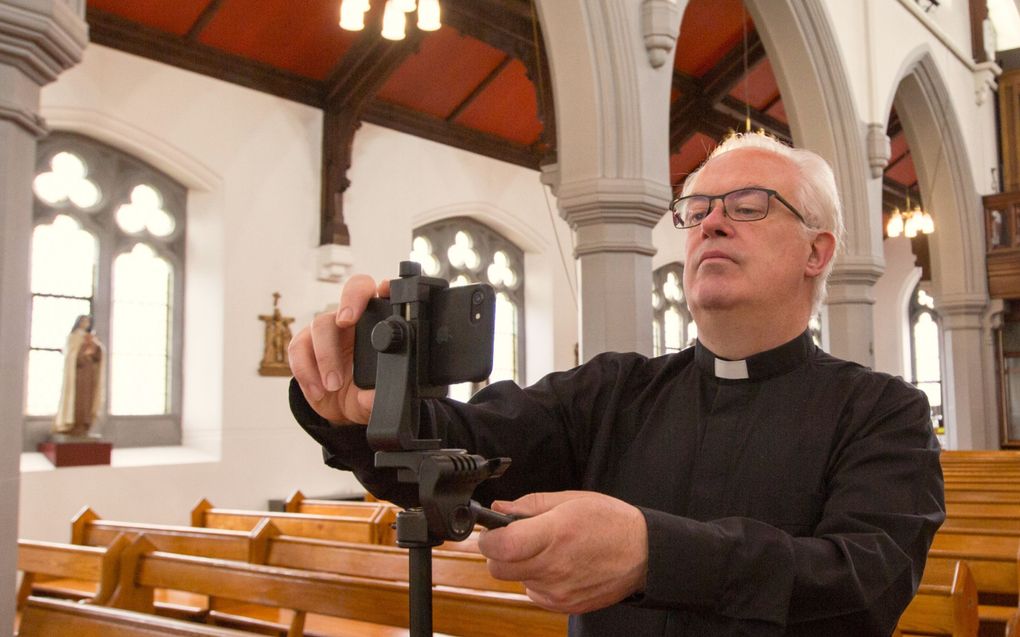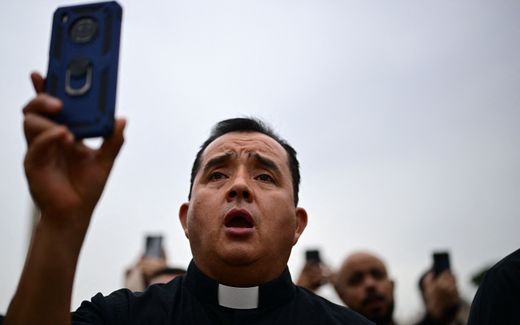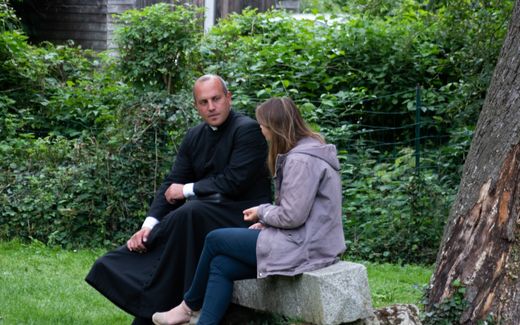TikTok is used to preach to new believers in Denmark
24-09-2025
Northern Europe
Tobias Frederiksen

A pastor in Scotland preparing his phone to record himself. Photo EPA, Robert Perry
Northern Europe
Faith is making a comeback in secular Denmark. Celebrities and politicians now speak openly about their faith, something unheard of a few years ago. This revival is stimulated by a new tool, TikTok.
Stay up to date with Christian news in Europe? Sign up for CNE's newsletter.
More and more young people have begun preaching the Gospel on the platform. These so-called “Christfluencers” share Bible verses, training sessions, and a wide range of other videos, all linked to Christian topics but expressed with Gen Z slang and trends. They represent a whole new generation of Christians who are masters of these digital platforms.
One of these Christian influencers, who has garnered thousands of views and likes, is 20-year-old Josva Rosenkilde. His videos are mostly what you would expect from a young Dane on TikTok: spending time with friends, going on holidays, and training at the gym. The twist, however, is that these videos are overlaid with religious messages. In other words, Josva uses trendy and relatable content that is coated in Christian language.

Josva grew up in the Church of Jesus Christ of Latter-day Saints in Horsens, Denmark. His experience with the church and with God inspired him to share his faith online, he tells CNE in an interview. “I was also encouraged to spread the good message after seeing other Christian content online, particularly from the United States”, he says.
As a small business owner, Josva had already used TikTok to promote his brand. Now, he began experimenting with Christian content to see whether it had an audience. There certainly was. By now, he has received thousands of likes and dozens of positive messages and feedback from young Danes.
The themes of his videos mostly revolve around dating culture, perfectionism, self-improvement and peace. This speaks right into the struggles of many Danish Gen Z’s, who deal with addictions, bad relationships, poor mental health and overall feelings of loneliness and meaninglessness.
In his videos, Josva shows how the Christian faith can be used to handle these everyday struggles. His videos have not directly increased attendance at his own church. But Josva explains that his aim is not to promote his own denomination. Josva could be described as an independent “Christfluencer” who shares the Gospel and Christian values independently, rather than as a church representative. In doing so, he contributes to the broader Christian movement in Denmark.
“My purpose is to help others on their journey towards Christ. They, in turn, can support the wider church”, he says. “My goal is to plant seeds of faith to help people get closer to God.”
So, how can churches use social media to grow?
Evangelising via social media is not only done by young people from the evangelical movement. Today, multiple traditional priests use platforms like TikTok and Instagram to reach young people. One is Andreas Skovbo Meng, a 34-year-old priest of a local Danish Church in Hornslet.

Andreas began preaching the Gospel to attract the attention of his Confirmation students. (Confirmation is a Lutheran practice where seventh-grade schoolchildren reaffirm their faith.) On TikTok, he goes by the name Pastor Meng.
“All my students were on TikTok and could name one influencer after another, but very few knew the biblical stories. When I discovered that there were practically no pastors on the platform, I decided to start my own profile to reach my students in their free time.”
So, what began as a simple tool for educating his students grew, and his profile, Pastor Meng, now has thousands of followers and hundreds of thousands of views. His videos vary from education in Church history to theology and sermons. The pastor is most known for his openness about faith and Christianity. Many of his videos contain him answering viewers’ questions to guide them further in their faith journeys.
His use of social media has resulted in followers and an increase in the number of young people in his church. “People who saw me on TikTok started coming to our church services. In fact, several have become part of the regular congregation.” This shows that this new preaching style has worked even for a smaller rural town like Hornslet.
However, using social media to spread the Gospel is not uncontroversial. Andreas has met other Danish priests who criticise his use of social media and claim that he uses it for personal popularity.
“I have met criticism. Some think social media is far too superficial. Others believe I’m self-absorbed because I’m always in the videos. Apparently, they think I’m trying to sell myself rather than the message.”
Andreas gives one piece of advice that every Church or Christian should consider before preaching on social media: “Speak the truth. Don’t think about new followers and what they want to hear.”
Mainstream churches
This point may be one of the reasons why other mainstream churches do not seem to benefit from the Danish Christian revival. For many years, the Danish state church has sought to be accepted by society, eroding some of its core traditions, ethics, and place as an institution that preaches the Gospel.
The new Christians seem drawn to churches with a greater focus on tradition, norms and a more literal bible reading. So if churches are truly to benefit from this once-in-a-generation interest in the Church and Christianity, they most keep in mind that this interest is sparked by what makes Christianity different from current society. Like the Christfluencer Josva, young people are attracted to a solution to their issues. As they look on social media for these solutions, they realise that might be where churches need to be.
Key numbers
A new opinion poll from July reveals a spike in religious belief. Among 18–34-year-olds, 36 per cent say they believe in one or more gods.
When asked, Do you believe that Jesus is the Son of God?, 28.5 per cent responded yes, an increase of 5 and 4 percentage points respectively compared to the 35–49 age group, Kristeligt Dagblad reports. This marks Denmark’s first rise in overall religious belief in a decade. Gen Z is now more spiritual than their parents. The increase is significant enough that the atheist organisation Ateistisk Selskab, which commissioned the poll, has admitted they are “worried about the trend.”
The number of church members of more traditional churches like the Catholic Church is also rising. Here, the total membership has increased by an astonishing 29 per cent since 2013, attributed to migration but also conversions, Kristeligt Dagblad writes.
Related Articles







